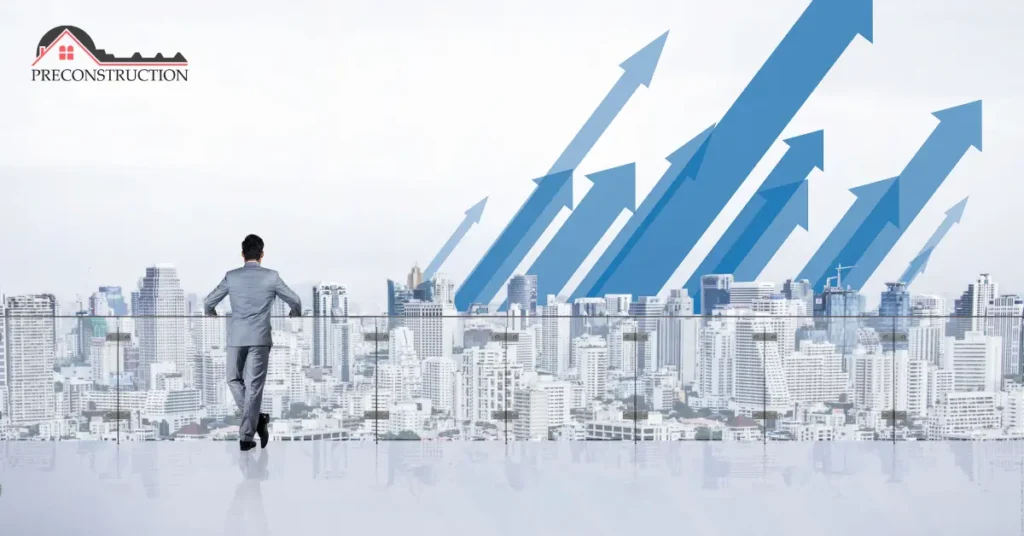Investing in pre-construction condos in Canada can be an excellent strategy for building wealth, but it’s essential to Investment Secrets Revealed: A Deep Dive into Pre-Construction Condos in Canada
Investing in pre-construction condos in Canada can be a powerful wealth-building strategy for savvy investors. With the real estate market in cities like Toronto, Vancouver, and Montreal consistently experiencing growth, pre-construction investments offer unique advantages such as lower upfront costs, customization options, and price appreciation.
This blog will explore the many aspects of investing in pre-construction condos, including how they work, the key benefits, potential risks, and expert strategies to maximize your returns. We’ll also cover common legal considerations, tax implications, and much more to help you make informed decisions when diving into this investment opportunity.
Understanding Pre-Construction Condos: An Overview
What are Pre-Construction Condos? Pre-construction condos refer to properties that are purchased before they are built. Buyers commit to purchasing a unit, typically by signing a purchase agreement with the developer, and construction is completed over several years. Investors pay an initial deposit to reserve the unit, with the full balance typically due upon completion.
Pre-construction condos are especially popular in high-demand urban areas where real estate values continue to rise, providing an opportunity for investors to lock in prices and reap the benefits of property appreciation before the project is completed.
Why Pre-Construction Condos? Key Benefits
a. Price Appreciation
Pre-construction condos offer a unique advantage: investors can purchase units at today’s prices while the property appreciates over the years before it’s completed. This can lead to significant profits when the unit is ready for occupancy.
b. Lower Upfront Costs
Most pre-construction projects have structured deposit payments, meaning buyers don’t have to come up with the full purchase price upfront. Typically, deposits are spread over months or even years, making it easier for investors to manage cash flow.
c. No Immediate Mortgage
Since the condo is not yet built, investors don’t need to start mortgage payments right away. Instead, you can take advantage of the time lag to prepare for the mortgage payments that will only start after completion.
d. Customization Options
Pre-construction buyers often have the opportunity to customize their units with preferred finishes, fixtures, and layouts. This allows you to tailor the space to your preferences or enhance its appeal to future tenants or buyers.
e. Developer Incentives
Developers may offer incentives such as free upgrades, discounts on parking spaces, or reduced closing costs, further enhancing the value of your investment.
Risks and Challenges of Pre-Construction Condo Investments
As with any investment, pre-construction condos come with risks and challenges, which you should be aware of before diving in.
a. Construction Delays
While developers provide estimated timelines, delays due to labor shortages, permit issues, or other construction obstacles are common. These delays can stretch out your investment timeline.
b. Market Volatility
Real estate markets are subject to fluctuations. If market conditions change during the development period, the value of your condo could be affected.
c. Project Cancellations
In rare cases, developers may cancel projects due to financial difficulties or lack of demand. Although buyers typically receive their deposits back, the time lost could mean missed investment opportunities elsewhere.
d. Financing Challenges
Securing a mortgage for a pre-construction condo can be more complicated than for an existing property. Lenders may have stricter criteria for approving loans, and mortgage rates may change by the time the project is complete.
e. High Closing Costs
Pre-construction buyers often face additional fees during closing, such as development charges, utility hook-up fees, and other levies that can significantly increase the final purchase price.
Strategies for Successful Pre-Construction Condo Investments
a. Choose the Right Location
Location is crucial in any real estate investment. Look for areas with strong growth potential, proximity to transit, schools, and amenities. Major cities like Toronto, Vancouver, and Montreal often provide lucrative opportunities, but up-and-coming cities like Ottawa and Calgary can also offer excellent growth prospects.
b. Research the Developer
Not all developers have a track record of successful projects. Do your homework and choose developers with a history of delivering projects on time and within budget.
c. Select Optimal Floor Plans
Certain layouts and unit configurations are more desirable than others. Units with abundant natural light, practical layouts, and good views tend to command higher resale or rental values. Avoid units with poor layouts or undesirable features, such as awkwardly shaped spaces.
d. Timing Your Purchase
Purchasing early in the development process can offer the best prices. However, avoid buying during overheated market conditions, as this can lead to lower profits or increased risks.
e. Work with a Real Estate Professional
An experienced agent can guide you through the pre-construction process and help negotiate favorable terms. Their knowledge of the market can also be invaluable when selecting units or developers.
f. Long-Term Investment Strategy
Pre-construction condos should be viewed as a long-term investment. It often takes years for a project to complete, and holding onto the property for several years post-completion can allow for appreciation.
Legal and Tax Considerations for Pre-Construction Condos
a. HST/GST on New Condos
In Canada, new homes, including pre-construction condos, are subject to the Goods and Services Tax (GST) or Harmonized Sales Tax (HST), depending on the province. Buyers may be eligible for rebates, particularly if they intend to use the property as their primary residence.
b. Capital Gains Taxes
Selling your condo at a profit will likely trigger capital gains tax, which applies to 50% of the profit earned. This is particularly relevant for investors planning to flip their condo upon completion.
c. Assignment Sales
Some investors may choose to sell their pre-construction contract before the building is completed. This is called an assignment sale. While this can be profitable, there are legal and tax implications, including assignment fees and taxes on any profit earned from the sale.
Exit Strategies for Pre-Construction Condo Investors
It’s essential to have a clear exit strategy when investing in pre-construction condos. Here are a few common exit strategies:
a. Hold and Rent
Renting out the condo after completion can provide steady, long-term rental income. This strategy is particularly effective in cities with high rental demand.
b. Flip at Completion
Selling the condo after the project is completed can be profitable if the market has appreciated during the construction period. However, this strategy depends heavily on current market conditions.
c. Assignment Sale
Selling the purchase agreement before the condo is completed can provide early profits. However, assignment sales are subject to various fees and taxes, so it’s crucial to work with a lawyer familiar with assignment contracts.
FAQs: Pre-Construction Condo Investments
What is the typical deposit structure for pre-construction condos?
- Deposit structures vary, but they typically range from 15% to 25%, paid in installments over several months or years.
What happens if the project is canceled?
- In most cases, buyers will receive their deposits back if a project is canceled. However, any potential appreciation during that time is lost.
How long does it take to complete a pre-construction condo?
- The timeline varies by project, but most pre-construction condos take 2 to 5 years to complete.
Can I sell my pre-construction condo before it’s finished?
- Yes, you can sell your contract via an assignment sale, but this may come with additional legal and tax implications.
What hidden costs should I consider?
- Common hidden costs include development charges, utility connection fees, and HST/GST. It’s essential to budget for these when calculating your total investment.
Are there financing options available for pre-construction condos?
- Yes, but securing a mortgage may be more complex. Lenders often offer pre-approval but require final approval closer to the completion date.
Is there a cooling-off period for pre-construction condo purchases?
- Yes, there is typically a 10-day cooling-off period, during which buyers can back out without penalties.
Investing in pre-construction condos in Canada can be an excellent opportunity for long-term wealth creation if done correctly. With proper planning, market research, and a clear understanding of the risks, investors can maximize their returns and minimize potential setbacks.
Discover the latest trends in the Toronto real estate market with Wedu, your trusted source for Ontario MLS listings and expert property analysis. For comprehensive insights into the pre-construction market in Toronto, check out Preconstruction Info to stay informed about new developments and investment opportunities. Enhance your property listings with stunning real estate photography services in Toronto from Click Media Pro.







